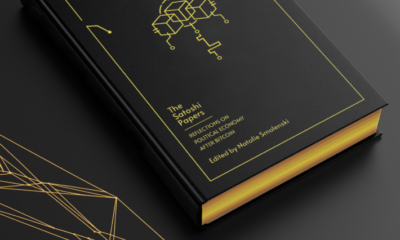Takes
Wall Street Isn't Bitcoin Only – More Crypto ETFs Are Coming
Published
3 months agoon
By
admin
Nothing stops this train.

No, I’m not talking about the Federal Reserve money printer, I’m talking about the string of ETF announcements from Wall Street and the related crypto firms servicing it this week.
I’m talking about today’s hybrid Ethereum-Bitcoin ETF, yesterday’s XRP ETF, and what will likely be 2025’s basket memecoin ETF offering exposure to everything from PEPE to GIGA to HarryPotterObamaSonic10Inu.
If you’re takeaway from the arguably dismal ETH ETF launch is that there won’t be more crypto ETFs, I’m sorry but you’re looking past the $1 trillion price tag on the rest of the crypto industry.
Wall Street wants to sell products that make U.S. dollars, and they will continue to do things that make dollars.
OK, in a bear market, maybe that’s not an Ethereum ETF. But it’s hard to imagine that in a world where the U.S. regulatory environment continues to become “more advantageous to the industry,” and there aren’t 15 to 20 of these ETFs all pumping in a bull market.
Maybe you’ve forgotten how in 2017 XRP pumped to $4 or DASH to $700, how in 2021, JPEGs sold for hundreds of millions. Newsflash: 80% of ETF purchasers are retail buyers, and that’s according to Blackrock.
Maybe you think all our proselytizing to the likes of Rick Rubin has seeped somehow into the collective consciousness. Maybe you’re betting on Kamala Harris getting elected, and that she will continue to let Gary Gensler and the SEC run roughshod over crypto.
Fair enough. That’s not a world I see. The Bitcoin-crypto voter constituency is here, and whether it delivers the election to Donald Trump, or it wins concessions from the Harris administration, that means more ETFs, not less. Certainly not a world where there’s only a Bitcoin ETF anytime soon.
Again, Wall Street is not embracing the tao of Michael Saylor, they don’t see President Nayib Bukele as a developing world savant. They do not believe Bitcoin is a bulwark against money printing, and no it doesn’t matter that they are writing research reports to the effect.
They will say whatever they can to sell ETFs, to make USD.
Because they are not convicted buyers. They are convicted sellers. There’s a difference.
Source link
You may like


Metaplanet Bitcoin Reserves Grow With Fresh $61 Million Purchase


Investors turn to Lightchain AI 3000x potential after PEPE drop


Moonpay In Talks To Acquire Coinbase Commerce Rival Helio


The Satoshi Papers Explores The Role Of The State In A Post-Bitcoin World: An Interview With Natalie Smolenski


Stablecoin Issuer Tether Invests $775,000,000 Into YouTube Rival Rumble


Solana L2 Sonic includes TikTok users in airdrop



Recently, BlackRock released an educational video explaining Bitcoin, which I thought was great—it’s amazing to see Bitcoin being discussed on such a massive platform. But, of course, Bitcoin X (Twitter) had a meltdown over one specific line in the video: “There is no guarantee that Bitcoin’s 21 million supply cap will not be changed.”
HealthRnager from Natural News claimed, “Bitcoin has become far too centralized, and now the wrong people largely control its algorithms. They are TELLING you in advance what they plan to do.”
Now, let me be clear: this is total nonsense. The controversy is overhyped, and the idea that BlackRock would—or even could—change bitcoin’s supply is laughable. The statement in their video is technically true, but it’s just a legal disclaimer. It doesn’t mean BlackRock is plotting to inflate bitcoin’s supply. And even if they were, they don’t have the power to pull it off.
Bitcoin’s 21 million cap is fundamental—it’s not up for debate. The entire Bitcoin ecosystem—miners, developers, and nodes—operates on this core principle. Without it, Bitcoin wouldn’t be Bitcoin. And while BlackRock is a financial giant and holds over 500,000 Bitcoin for its ETF, its influence over Bitcoin is practically nonexistent.
Bitcoin is a proof-of-work (PoW) system, not a proof-of-stake (PoS) system. It doesn’t matter how much bitcoin BlackRock owns; economic nodes hold the real power.
Let’s play devil’s advocate for a second. Say BlackRock tries to propose a protocol change to increase bitcoin’s supply. What happens? The vast network of nodes would simply reject it. Bitcoin’s history proves this. Remember Roger Ver and the Bitcoin Cash fork? He had significant influence and holdings, yet his version of bitcoin became irrelevant because the majority of economic actors didn’t follow him.
If Bitcoin could be controlled by a single entity like BlackRock, it would’ve failed a long time ago. The U.S. government, with its endless money printer, could easily acquire 10% of the supply if that’s all it took to control Bitcoin. But that’s not how Bitcoin works. Its decentralized nature ensures no single entity—no matter how powerful—can dictate its terms.
So, stop worrying about BlackRock “changing” Bitcoin. Their influence has hard limits. Even if they tried to push developers to change the protocol, nodes would reject it. Bitcoin’s decentralization is its greatest strength, and no one—not BlackRock, not Michael Saylor—can change that.
This article is a Take. Opinions expressed are entirely the author’s and do not necessarily reflect those of BTC Inc or Bitcoin Magazine.
Source link
El Salvador
The IMF Just Improved El Salvador’s Bitcoin Law
Published
2 days agoon
December 21, 2024By
admin

The IMF yesterday announced they have reached a $1.4 billion loan deal with El Salvador. In return, the Central American country that in 2021 made bitcoin legal tender had to remove some of its pro-Bitcoin policies.
I spent about three months in El Salvador around the time the Bitcoin law went into effect. I thought then that it was a positive development for the country, but there were aspects of the law that I strongly disliked. Exactly these aspects are now being removed.
Most importantly, Salvadoran merchants will no longer be obligated to accept bitcoin. Great! I don’t think Bitcoin should be forced on anyone, nor do I believe Bitcoin needs that. Bitcoin is an emergent form of free market money, and adoption should happen voluntarily.
(In practice, this aspect of the law was barely enforced anyways. I’ve heard from one relative insider that some of the big fast food chains received phone calls from the government telling them to comply — which would explain why McDonald’s and Wendy’s did it — but otherwise I don’t think any merchants got in trouble for not accepting bitcoin.)
Additionally, El Salvador will have to wind down operations of its Chivo wallet. Maybe the software has improved over the years, but in 2021 the wallet was incredibly buggy; the open source community and free market are much more capable of building such tools. Good riddance!
That said, it is slightly disappointing that Salvadoran citizens won’t be able to pay tax in bitcoin anymore — though, again, I doubt many did. This is probably little more than a nuisance, however. Now, bitcoin-accepting merchants need to sell some of their BTC for USD before paying the taxman.
To succeed, Bitcoin benefits from an equal playing field. El Salvador still goes a long way to offer just that.
This article is a Take. Opinions expressed are entirely the author’s and do not necessarily reflect those of BTC Inc or Bitcoin Magazine.
Source link
Opinion
It’s Time to Admit It – There Are Only 2.1 Quadrillion Bitcoins
Published
3 days agoon
December 21, 2024By
admin
If the above statement offends you, you might not have read the Bitcoin source code.

https://x.com/pete_rizzo_/
Of course, I’m sure you’ve heard that there are 21 million bitcoin – and this is true, the Bitcoin protocol allows for only “21 million bitcoin” to be created, yet these larger denominations can be subdivided into 100 million sub-units each.
Call them whatever you want, there are only 2.1 quadrillion monetary units in the protocol.
This dollars and cents differential has long been the subject of debate – in the time of Satoshi, Bitcoin’s creator, the dual conventions, Bitcoin having both a bulk denomination, and a smaller unit, was not much of a concern. There were questions about whether the software would work at all, and bitcoin were so worthless, selling them in bulk was the only rational option.
Rehashing this debate is BIP 21Q, a proposal to the Bitcoin users authored by John Carvalho, founder of Synonym, creator of the Pubky social media platform, and a tenured contributor whose work dates back to the days of the influential Bitcoin-assets collective.
In short, the BIP proposes that network actors – the various wallets and exchanges – change how Bitcoin denominations are displayed, with the smallest unit of the protocol renamed “bitcoins,” as opposed to “satoshis,” as they have been commonly called.
Here are the specifics of the BIP:
Redefinition of the Unit:
- Internally, the smallest indivisible unit remains unchanged.
- Historically, 1 BTC = 100,000,000 base units. Under this proposal, “1 bitcoin” equals that smallest unit.
- What was previously referred to as “1 BTC” now corresponds to 100 million bitcoins under the new definition.
Terminology:
- The informal terms “satoshi” or “sat” are deprecated.
- All references, interfaces, and documentation SHOULD refer to the base integer unit simply as “bitcoin.”
Display and Formatting:
- Applications SHOULD present values as whole integers without decimals.
- Example:
- Old display: 0.00010000 BTC
- New display: 10000 BTC (or ₿10000)
Unsurprisingly, the debate around the BIP has been hostile. For one, it’s not a technical BIP, though this is not a requirement of the BIP process. Suffice to say, it’s perhaps the most general BIP that has been proposed under the BIP process to date, as it mainly deals with market conventions and user onboarding logic, not any changes to the software rules.
However, I have to say, I find the proposal compelling. Nik Hoffman, our News Editor, does not, preferring to stick to the market affirmative.
Yet, I think the proposal raises relevant questions: why should new users be forced to compute their Bitcoin balances using only decimals? Surely this has the adverse side effect of making commerce difficult – it’s simply antithetical to how people think and act today.
Also, in terms of savings, at an $100,000 BTC price, it isn’t exactly compelling to think you could be spending a whole year earning 1 BTC, though that may be.
Indeed, there have been various debates for all kinds of units – mBTC, uBTC – that play around with the dollars and cents convention, but Carvalho here is wisely skipping to the end, preferring just to rip the band-aid off. $1 would buy 1,000 bitcoins under his proposal.
What’s to like here, and I argued this during a Lugano debate on the topic in 2023, is that it keeps both the larger BTC denomination and the smaller unit, now bitcoins. They are both important, and serve different functions.
My argument then was that having a larger denomination like BTC (100 million bitcoins) is important. If there was no “BTC unit,” the press and financial media would be faced to reckon that “1 bitcoin” is still worth less than 1 cent.
How much mainstream coverage and interest do we think there would be? I’d bet not very much.
In this way, BIP 21Q is a best-of-both-worlds approach.
The financial world, press, and media can continue championing the meteoric rise in value of “BTC,” while everyday users can get rid of decimals and complex calculations, trading the only real Bitcoin unit guaranteed to exist in perpetuity.
This article is a Take. Opinions expressed are entirely the author’s and do not necessarily reflect those of BTC Inc or Bitcoin Magazine.
Source link

Metaplanet Bitcoin Reserves Grow With Fresh $61 Million Purchase

Investors turn to Lightchain AI 3000x potential after PEPE drop

Moonpay In Talks To Acquire Coinbase Commerce Rival Helio

The Satoshi Papers Explores The Role Of The State In A Post-Bitcoin World: An Interview With Natalie Smolenski

Stablecoin Issuer Tether Invests $775,000,000 Into YouTube Rival Rumble

Solana L2 Sonic includes TikTok users in airdrop

5 Tokens Ready For A 20X After Solana ETF Approval

Solana beats Ethereum in a key metric 3 months in a row

SCENE’s 2024 Person of the Year: Iggy Azalea

BTC Risks Falling To $20K If This Happens

Most Layer 2 solutions are still struggling with scalability

Here’s why Stellar Price Could Go Parabolic Soon

Perp-Focused HyperLiquid Experiences Record $60M in USDC Net Outflows

Experts say these 3 altcoins will rally 3,000% soon, and XRP isn’t one of them

Robert Kiyosaki Hints At Economic Depression Ahead, What It Means For BTC?
182267361726451435

Why Did Trump Change His Mind on Bitcoin?

Top Crypto News Headlines of The Week

New U.S. president must bring clarity to crypto regulation, analyst says

Will XRP Price Defend $0.5 Support If SEC Decides to Appeal?

Bitcoin Open-Source Development Takes The Stage In Nashville

Ethereum, Solana touch key levels as Bitcoin spikes

Bitcoin 20% Surge In 3 Weeks Teases Record-Breaking Potential

Ethereum Crash A Buying Opportunity? This Whale Thinks So

Shiba Inu Price Slips 4% as 3500% Burn Rate Surge Fails to Halt Correction

Washington financial watchdog warns of scam involving fake crypto ‘professors’

‘Hamster Kombat’ Airdrop Delayed as Pre-Market Trading for Telegram Game Expands

Citigroup Executive Steps Down To Explore Crypto
Mostbet Güvenilir Mi – Casino Bonus 2024

NoOnes Bitcoin Philosophy: Everyone Eats
Trending

 3 months ago
3 months ago182267361726451435

 Donald Trump5 months ago
Donald Trump5 months agoWhy Did Trump Change His Mind on Bitcoin?

 24/7 Cryptocurrency News4 months ago
24/7 Cryptocurrency News4 months agoTop Crypto News Headlines of The Week

 News4 months ago
News4 months agoNew U.S. president must bring clarity to crypto regulation, analyst says

 Price analysis4 months ago
Price analysis4 months agoWill XRP Price Defend $0.5 Support If SEC Decides to Appeal?

 Opinion5 months ago
Opinion5 months agoBitcoin Open-Source Development Takes The Stage In Nashville

 Bitcoin5 months ago
Bitcoin5 months agoEthereum, Solana touch key levels as Bitcoin spikes

 Bitcoin5 months ago
Bitcoin5 months agoBitcoin 20% Surge In 3 Weeks Teases Record-Breaking Potential



